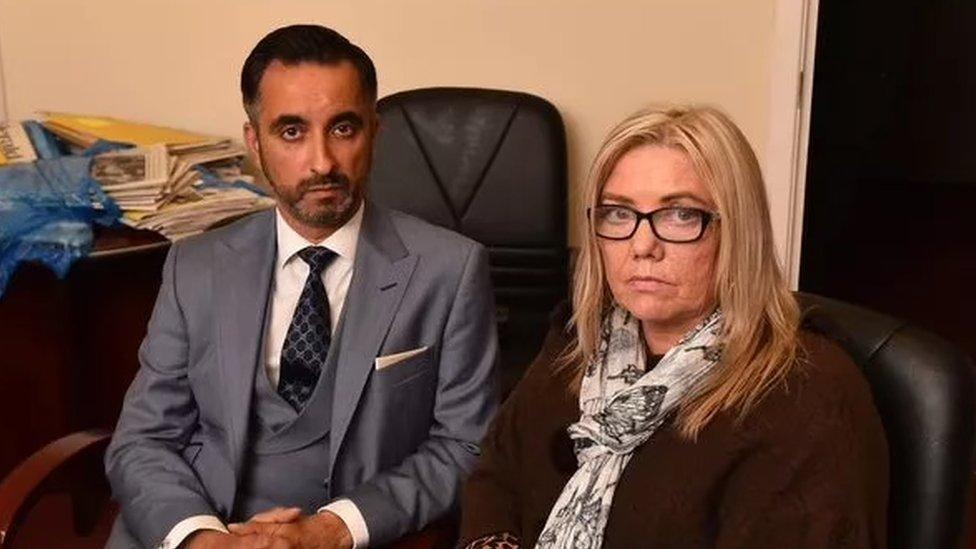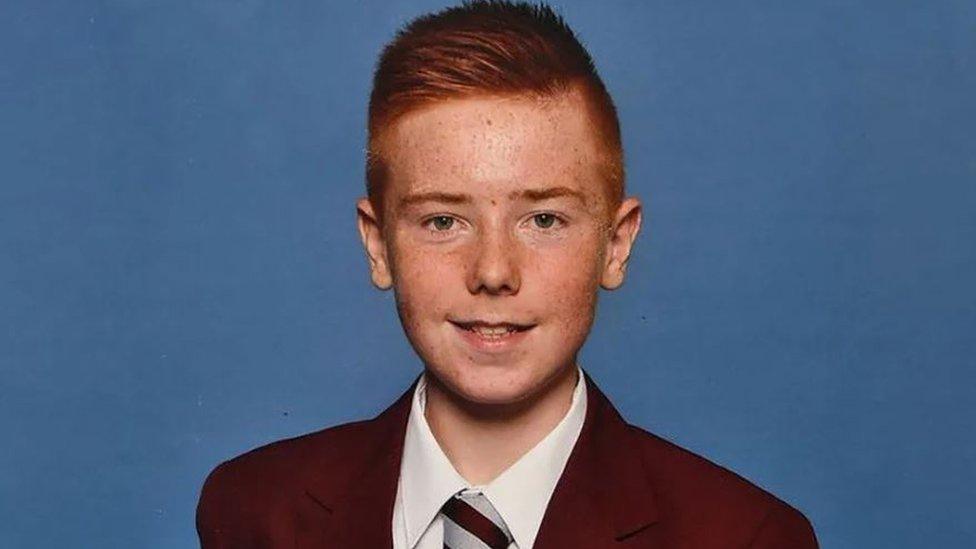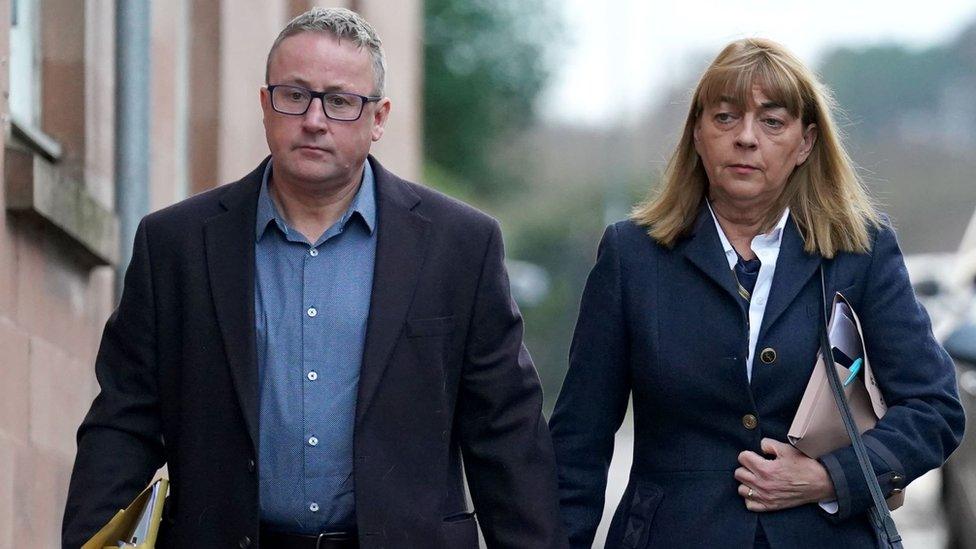Who was William? The forgotten face of a prison tragedy
- Published

William Brown took his own life at Polmont prison at the age of 16
William Brown had never been convicted of a crime and should never have been in prison.
The only "offence" the 16-year-old was guilty of was to be born into an unstable life.
But the teenager, also known as William Lindsay, would die behind bars after taking his own life at Polmont Young Offenders Institution in October 2018 - less than three days after he had arrived.
Few people knew who William was, until a fatal accident inquiry began in January into his death and that of Katie Allan, 21.
She had taken her own life at Polmont four months before William arrived at the prison - but that is where the similarities between the pair end.
Katie was sentenced to 16 months in prison in March 2018 for causing serious injury by dangerous driving and driving over the alcohol limit.
The Glasgow University geography student struggled with prison life and was found dead in her cell at Polmont in June of that year.
Since then, her parents Linda and Stuart have featured heavily in the media highlighting her case, her treatment in prison and campaigning tirelessly to be represented at a fatal accident inquiry to be held into her death.

Katie Allan took her own life in Polmont in June 2018
William, on the other hand, came from a very different background. Although loved, he spent most of his life under social care. Only two photographs have ever been seen of him in the media and little is known about him.
The heartbreaking end to his life echoes its equally tragic start.
The inquiry heard he was taken into care in 2002 - the year after he was born in Glasgow - after his father admitted issues with alcohol and separated from his mother.
William Brown senior had limited contact with his son. In a statement to the inquiry he said the last time he saw him was on a bus seven months before he died.
William lived in 27 social work placements, including foster care and secure children's units.
At the time he was sent to Polmont he was back home with his mum Christine Lindsay, who has since died.
Before she died she did the best she could for her son, trying to bring attention to what had happened to him.

William Brown's mother Christine Lindsay (pictured with lawyer Aamer Anwar) did what she could to find justice for William
William had two sisters - Chloe and Shannon. They also died in the years since they lost William. His half-brother John Reilly was represented at the inquiry.
His statement said he had kept contact with William and they had a strong relationship.
According to his medical notes, William had thought about or attempted to kill himself on 14 occasions in his 16 years.
On 3 October 2018 he was arrested after walking into Saracen Street police station in Glasgow while carrying a knife.
John said: "From what I have been told about William's actions that led to his arrest it should have been obvious that this was a cry for help as opposed to a genuinely threatening situation.
"He was clearly in the midst of a crisis and looking to get help by any means possible."
The inquiry heard from a mental health worker who agreed that William was feeling suicidal, and that she understood he had gone into the police station for help.

William Brown, sometimes known as William Lindsay, was found dead in his cell in October 2018
After his arrest, William was remanded in custody and was sent to Polmont, near Falkirk, where he would die later that month, despite only being 16 - and therefore a child in the eyes of Scots law.
Polmont is Scotland's national holding facility for young people aged between 16 and 21.
William only went there because a place could not be found for him in a secure children's unit. Many of them had been rented out to English authorities.
His subsequent death was a shock to half-brother John, who said: "William was doing well and working for a family member washing cars in a garage in Maryhill.
"He would cycle to the garage every day and he had been doing that for about six to eight weeks prior to his arrest. He had also started looking forward to being able to learn to drive and passing his test."
The family were devastated, with John saying: "William's death set in motion a period of my life which has caused unspeakable grief, losing not only William, but my two sisters and my mother, all in quick succession.
"None of the family could come to terms with what happened to William, and I have no doubt that his death played a part in what followed thereafter."

William was found dead in his cell at Polmont just days after he arrived
Outside of the family, those who knew William best were his social workers.
One of them, Mark McDonald, gave evidence at the inquiry hearings.
He told BBC Scotland News: "I had the pleasure of knowing William for a year.
"It is well documented that William's life was unpredictable, and he had many changes in his life growing up.
"William was great company and could be very funny. He could communicate his opinions clearly and was able to be diplomatic and negotiate with workers and family when trying to push normal teenage boundaries.
"This was usually accomplished with humour, charm and being his mum's 'wee boy'."
Mark remembered fondly that the teenager took pride in his appearance and enjoyed spending his money on clothes.
At one point he was horrified on a shopping trip when Mark suggested that his money would go further if he bought a "very uncool" non-branded tracksuit.
He added: "His mum Christine was very proud of him, and he was hoping to explore college options. William was a teenager who had bags of potential and everyone that knew him would agree.
"He had his vulnerabilities - however, spending time with him was better than any day working in the office."
His social work team leader, Karen Russell, who sat through the inquiry said: "Everyone who worked with William cared deeply for him.
"He was such a character; bright, funny and so well thought of by us all. The loss of William has had a devastating impact on those who had the joy of spending time with him."

Stuart and Linda Allan spoke up for their daughter Katie - and also for William
William's death may have gone unnoticed by the public if it wasn't for the family of Katie Allan.
Speaking to BBC Scotland news, Linda Allan said: "I think what has really struck us about the fatal accident inquiry is that it is cojoined with William.
"Two young people - their backgrounds couldn't be more diverse and more different - but with the same outcome. And also the same issue with sentencing.
"There was Katie who had a positive social work report, there were no victim issues but the sheriff still deemed it appropriate to send her to custody.
"She wasn't a risk to the public. She was full of remorse, would have wanted to be punished so a community sentence would have been needed.
"And there's young William with all of the information from the services involved in his life, all the background information from the children's reporter, and he was still remanded."
She added: "Hopefully through our campaigning and others campaigning, the sentencing guidelines although they've had some bad press would stop that happening today, that no future William or Katie would end up in the young offenders institute."
The Crown has said there was enough evidence to prosecute the prison under health and safety legislation but the Scottish Prison Service has Crown immunity.
Nine people have taken their own lives at the Polmont facility since 2012.
Like William's family, the Allans hope lessons will be learned.
But their lawyer, Aamer Anwar, who has long campaigned for changes at the Polmont facility, told BBC Scotland News that despite multiple fatal accident inquiries, nothing had changed.
"It's been five-and-a-half long years of heartbreak, pain, anguish and grief," he said.
"In that period I've watched Linda and Stuart crying until they had no more tears and I have watched Christine, who was William's mother. She died, he lost his two sisters, John is still fighting and it is tragedy after tragedy.
"Every time there's a death we say not again. This is a system that is supposed to have changed.
"I am extremely angry and I feel the pain every other family goes through when there is a suicide. Polmont has lied to families. There is no accountability, no way of prosecuting them."
There will be a further evidential hearing later this month and the sheriff will make his determination after that.
The same sheriff is also due to sit in a fatal accident inquiry into another death in Polmont - Jack McKenzie, 20, was found dead in his cell in September 2021.